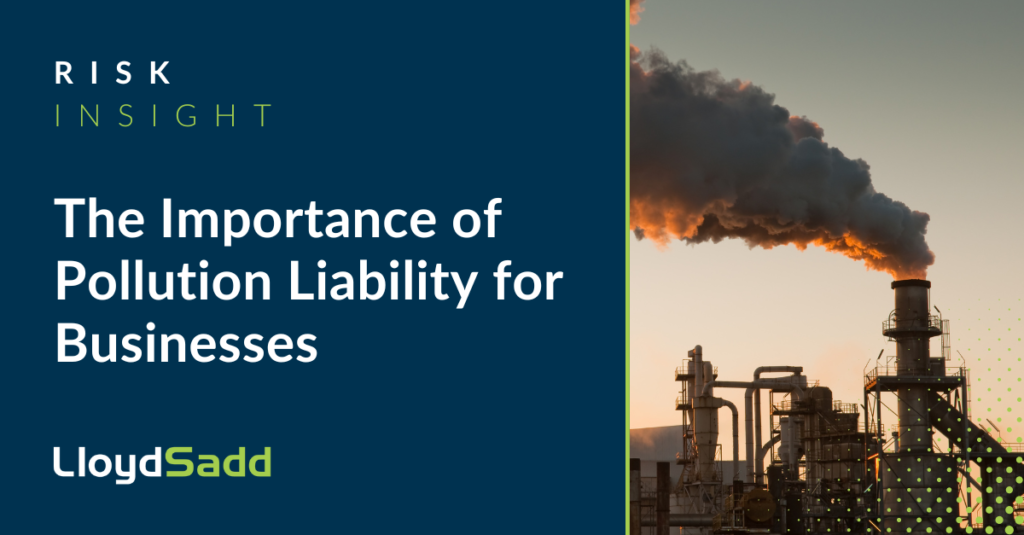The Importance of Pollution Liability

Pollution liability is a critical concern for Canadian companies across various industries. Environmental incidents can have severe consequences, leading to substantial cleanup costs, legal liabilities, and reputational damage. Let’s delve into why pollution liability insurance is essential for Canadian businesses.
Environmental Risk Exposure
Pollution liability is a risk faced not only by organizations handling large quantities of hazardous materials but also by smaller operations, such as maintenance shops and even bakeries. Any organization that owns or manages property could potentially be liable for environmental contamination caused by a previous user. For example, if a company buys a property with historical contamination, they may inherit the responsibility for cleanup and restoration. When purchasing Pollution Liability coverage, talk to your broker about exploring options with historical site coverage to cover any contamination done by previous site users. Individual directors and officers can also be held liability for contamination. It’s essential they understand their potential exposure and take necessary precautions to protect themselves.
Significant Financial Risks
Without proper pollution liability coverage, a minor environmental disaster can have devastating financial consequences for a business. Cleanup costs, fines, and legal expenses related to pollution incidents can be substantial. Unlike some other risks, there is no upper limit on the cost of environmental cleanup. Therefore, having adequate insurance coverage is crucial to protect a company’s financial stability.
Legal Liabilities and Fines
Canada has stringent environmental laws and regulations at the federal, provincial, and municipal levels. Non-compliance can result in hefty fines, penalties, and legal liabilities Pollution liability insurance can help cover these costs, protecting companies from the financial impact of regulatory violations.
Third-Party Claims
Companies can face third-party claims for bodily injury, property damage, or environmental harm caused by their operations or pollution incidents. These claims can arise from neighboring properties, waterways, or affected individuals, leading to costly legal battles and compensation payments. Pollution liability insurance provides coverage for such third-party claims.
Reputational Risks
Environmental incidents can severely damage a company’s reputation, diminishing public confidence and potentially threatening its ability to continue operations. Pollution liability insurance often includes coverage for crisis management expenses, such as public relations services, to mitigate negative publicity and restore the company’s image.
Contractual Requirements
In some cases, pollution liability insurance is a mandatory requirement for certain contracts or projects. While general liability insurance policies may provide limited coverage for pollution incidents, they often exclude or severely limit environmental exposures. As such, pollution liability insurance is a crucial risk management tool for Canadian companies operating in industries with potential environmental impacts, such as construction, manufacturing, transportation, and energy. By investing in pollution liability insurance, businesses can protect themselves from the substantial financial, legal, and reputational risks associated with environmental incidents, ensuring their long-term viability and compliance with regulatory requirements.
Coverage Options
Pollution policies are not standardized and coverages offered may vary depending on the insurance company. Some examples of different types of coverage include:
- Gradual Pollution
- Sudden & Accidental
- Transportation Pollution
- Non-Owned Disposal Site Coverage
- Emergency Response
Policies may also be written on a Claims-Made or Occurrence basis so it’s important to discuss your options with your broker and understand the implications of both.
Proactive Risk Management
In addition to insurance coverage, companies should implement proactive risk management strategies to minimize the likelihood of environmental incidents. This may include regular inspections, employee training, and the implementation of best practices for handling hazardous materials and waste. By investing in Pollution Liability insurance, businesses can protect themselves from the substantial financial, legal and reputational risks associated with environmental incidents, while also demonstrating their commitment to environmental responsibility and sustainability.